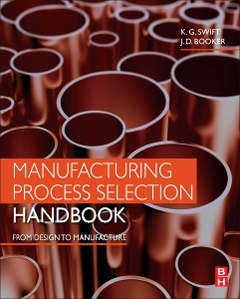Description
Manufacturing Process Selection Handbook
Authors: Swift K. G., Booker J. D.
Language: English
Subject for Manufacturing Process Selection Handbook:
456 p. · 19x23.3 cm · Hardback
Description
/li>Contents
/li>Readership
/li>Biography
/li>Comment
/li>
Manufacturing Process Selection Handbook provides engineers and designers with process knowledge and the essential technological and cost data to guide the selection of manufacturing processes early in the product development cycle.
Building on content from the authors? earlier introductory Process Selection guide, this expanded handbook begins with the challenges and benefits of identifying manufacturing processes in the design phase and appropriate strategies for process selection. The bulk of the book is then dedicated to concise coverage of different manufacturing processes, providing a quick reference guide for easy comparison and informed decision making.
For each process examined, the book considers key factors driving selection decisions, including:
- Basic process descriptions with simple diagrams to illustrate
- Notes on material suitability
- Notes on available process variations
- Economic considerations such as costs and production rates
- Typical applications and product examples
- Notes on design aspects and quality issues
Providing a quick and effective reference for the informed selection of manufacturing processes with suitable characteristics and capabilities, Manufacturing Process SelectionHandbook is intended to quickly develop or refresh your experience of selecting optimal processes and costing design alternatives in the context of concurrent engineering. It is an ideal reference for those working in mechanical design across a variety of industries and a valuable learning resource for advanced students undertaking design modules and projects as part of broader engineering programs.
- Introduction to the Handbook
- Process Selection Strategies and Case Studies
- Casting Processes
- Forming Processes
- Plastics and Composites Processing
- Machining Processes
- Non-traditional Machining Processes
- Rapid Prototyping Processes
- Surface Engineering Processes
- Assembly Systems
- Joining Processes
- Component Costing
- Assembly Costing
Appendices
A Guidelines for Design for Manufacture
B Guidelines for Design for Assembly
C Weld Joint Design Configurations
D Blank Component Costing Table
E Blank Assembly Costing Table
References Bibliography Relevant British Standards Design and Manufacture Related Web Sites
Dr Julian Booker is Reader in Design and Manufacture at University of Bristol, UK, and a recognized expert in product design and process engineering. Working closely with industry, his research interests include the development and industrial implementation of design methods for manufacture, assembly, quality and reliability improvement, and the structural integrity of frictional machine elements using simulation and experimental methods.
- Provides manufacturing process information maps (PRIMAs) provide detailed information on the characteristics and capabilities of 65 processes in a standard format
- Includes process capability charts detailing the processing tolerance ranges for key material types
- Offers detailed methods for estimating costs, both at the component and assembly level




